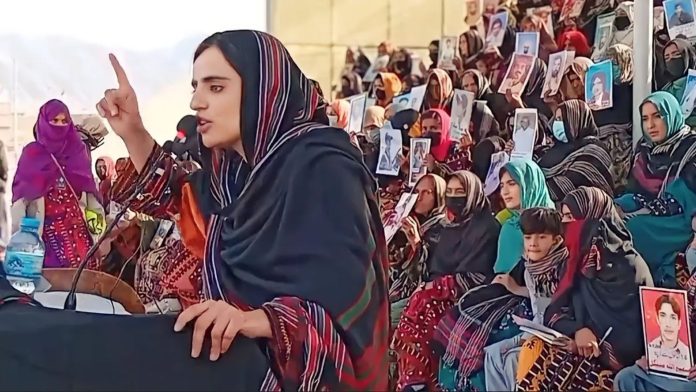Dr. Mahrang Baloch, a central organizer for the Baloch Yakjehti Committee, has sharply criticized the Pak Army for its actions in Gwadar, and of using violence and misinformation to undermine a peaceful protest. In a recent statement, Dr. Baloch condemned the occupied-state’s decision to cut off internet and network access and to intimidate participants at gunpoint, while pretending to engage in negotiations. She asserted that the Army and its institutions do not recognize or allow peaceful, constitutional and legal struggles.
Since announcing the Baloch Raaji Muchi movement, the committee has repeatedly emphasized through media channels that it is a one-day peaceful national gathering. Despite these assurances, the committee has faced harassment and attempts to sabotage the event. They were pressured to change the location of the Raaji Muchi, but they have maintained that it is a peaceful political process and their constitutional and legal right to hold such gatherings.
The committee had assured the Deputy Commissioner of Gwadar, two weeks prior to the event, that the Raaji Muchi would be peaceful and took responsibility for any damage. However, the Paki establishment refused to acknowledge this, insisting that Gwadar was a sensitive area. While they consider Gwadar sensitive, the committee views it as their own land and asserts that they have the right to hold peaceful gatherings there.
Dr. Baloch said that despite repeated warnings to the Army through press conferences and meetings with local officials, the Army proceeded with using force against the peaceful gathering. This escalation has led to the transformation of the one-day event into an ongoing sit-in protest, with widespread demonstrations across Pak-occupied-Balochistan. The region has been in shutdown for the past five days, with Gwadar and Makran paralyzed by an undeclared curfew.
The Baloch Yakjehti Committee has now turned the Raaji Muchi into a peaceful sit-in protest, demanding the immediate release of all detained or forcibly disappeared participants and the reopening of all routes in Pak-occupied-Balochistan. The Army’s response has been to continue using force rather than addressing these demands.
Dr. Baloch criticized the Army for sending military intelligence officers to target the committee’s leadership and for surrounding and attacking the sit-in site with Army and Frontier Corps personnel. Arrests and violence have been reported in Tilar, Karachi, Quetta, and Barkhan, further demonstrating the Pakistan establishment’s aggressive stance.
Mahrang emphasized that negotiations cannot occur under threat or force and called on the Pak Army to halt its violent actions if it wishes to engage in genuine dialogue. The sit-in continues on Gwadar’s Padi Zahr (Marine Drive) with the committee’s demands remaining unchanged. Mahrang urged the Pak Army to either address the demands directly or to test their resolve, asserting that the committee’s commitment to a peaceful struggle will not be deterred by the Army’s use of force.

